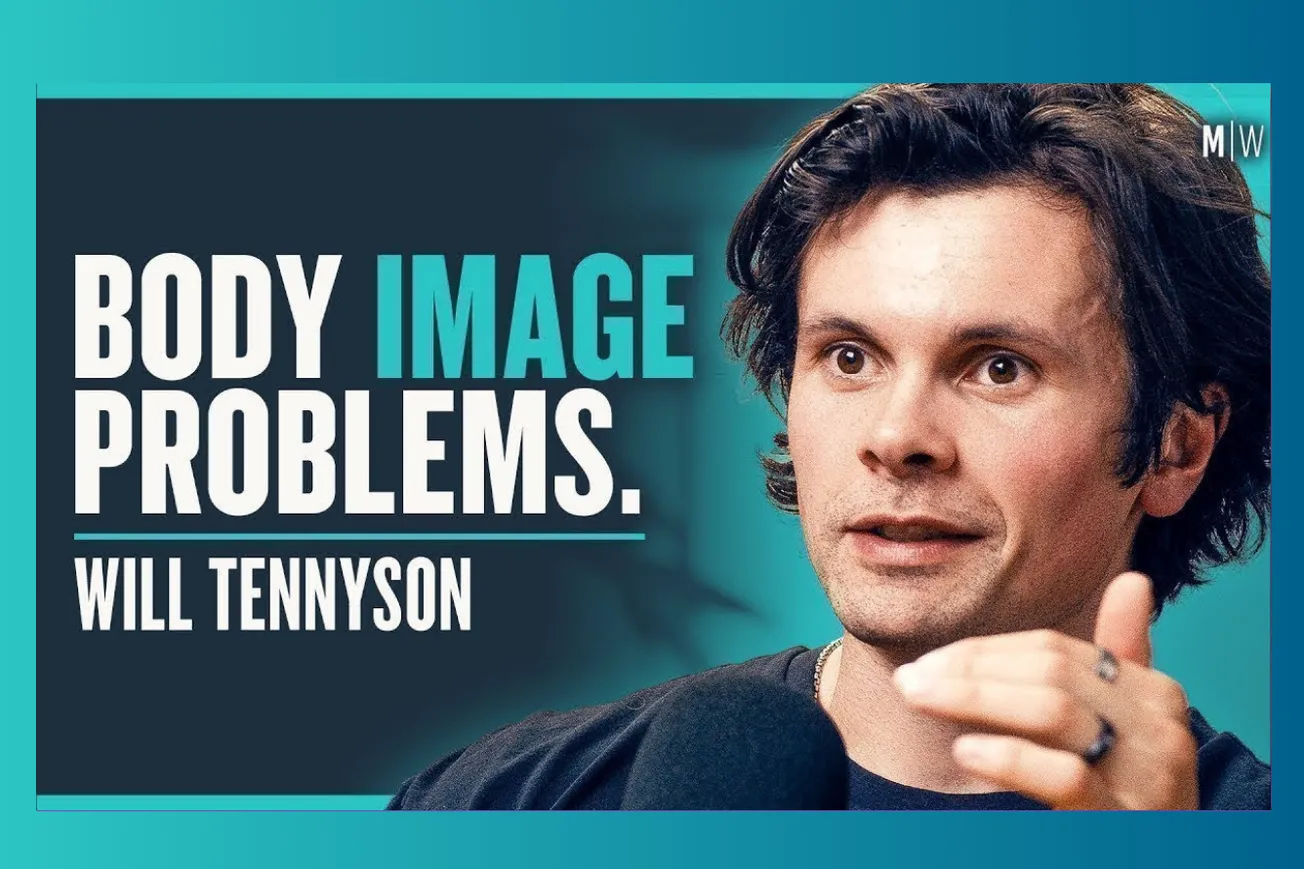Table of Contents
Fitness YouTuber Will Tennyson opens up about wearing a 600-pound fat suit, battling eating disorders, and why male body dysmorphia is rapidly overtaking female body dysmorphia in modern society.
Key Takeaways
- Tennyson's 600-pound fat suit experiment revealed the psychological trauma of public scrutiny that obese individuals face daily, triggering his own past experiences with weight struggles
- Male body dysmorphia is projected to overtake female body dysmorphia within the next two decades, with young men increasingly obsessed with achieving unrealistic physiques through steroids
- His "macro fasting" approach involves eating only protein during the day and saving carbs and fats for nighttime cravings, helping manage his naturally high appetite
- The fitness industry splits between entertainment content and hardcore bodybuilding, with many young men gravitating toward dangerous steroid use without understanding long-term consequences
- Tennyson battled severe eating disorders after losing over 100 pounds rapidly, driven by external validation rather than internal motivation for change
- The "lonely chapter" describes the isolating period when people begin personal development but haven't yet found their new community - a crucial phase that YouTube content helps people navigate
- Turning 30 triggered intense mortality awareness and anxiety about aging that he'd never experienced in his twenties, representing a common male psychological transition
- His impostor syndrome remains severe despite YouTube success, feeling unworthy of opportunities and unable to appreciate achievements due to ingrained self-doubt patterns
- Modern hybrid training (lifting plus running) appeals to experienced lifters seeking new progress metrics after years of minimal strength gains
- Bryan Johnson's extreme longevity protocols demonstrate the pleasure some people derive from optimization processes, even when outsiders question the quality of life sacrifices
Timeline Overview
- Childhood Weight Struggles (Ages 12-18) — Gained weight to 275 pounds despite being active in hockey, developed shame around body image, used food as emotional comfort while maintaining athletic performance
- Rapid Weight Loss and Eating Disorder (Ages 18-19) — Lost over 100 pounds in under a year through severe calorie restriction, experienced fainting and malnutrition, became addicted to scale dropping
- Recovery and YouTube Beginning (Ages 20-25) — Found healthier relationship with food and exercise, started making videos for school projects, discovered passion for content creation over culinary school plans
- YouTube Growth Phase (2019-2022) — Channel exploded from 0 to 100,000 subscribers in six months, transitioned from culinary school to full-time content creation, established fitness entertainment niche
- Mental Health Challenges (Ages 25-30) — Dealt with impostor syndrome, work-life balance issues, grief over pet's death, learned to prioritize mental health over constant content creation
- Current Maturity Phase (Age 30+) — Grappling with mortality awareness, developing healthier boundaries, focusing on sustainable content creation while managing chronic self-doubt and appetite control
The 600-Pound Reality Check: Understanding Obesity Beyond 'Put the Fork Down'
- Tennyson's decision to wear a medical-grade 600-pound fat suit designed for healthcare training provided devastating insight into the daily psychological trauma experienced by severely obese individuals. The suit wasn't weighted but replicated the circumference and mobility limitations of extreme obesity.
- The experiment triggered unexpected emotional responses rooted in his own weight struggles: "It scared me... it took me back" to his teenage years when he weighed 275 pounds. The public reactions - staring, laughing, pointing, avoiding eye contact - created immediate psychological distress that intensified throughout the day.
- His interview with Brentley, a 575-pound man who had lost 250 pounds, revealed the complex psychology of obesity: "I can feel great about myself but when I go out and see how other people look at me, that influences how I see myself and then I stop going out and doing the things that I love because I feel like people don't want me there."
- The moment that nearly brought Tennyson to tears came when Brentley described his wake-up call: "I was in my grandma's basement and all of a sudden I just woke up from this fog... I went to the mirror, looked at myself and started to panic and I wanted to start grabbing all the fat off my body because I was so scared of how fat I was."
- This experience fundamentally challenged the fitness industry's simplistic "eat less, move more" messaging by revealing the deeper psychological and social factors that perpetuate obesity cycles. The shame and isolation created by public judgment often drives people away from the very activities that could improve their health.
- Tennyson's own weight history included eating massive quantities even of healthy foods - having multiple dinners in one evening, constantly snacking while gaming - demonstrating how genetic factors like appetite regulation can override willpower-based approaches to weight management.
The Genetics of Appetite: Why 'Just Work Harder' Fails
- Tennyson's struggle with appetite control illustrates the genetic component of weight management that the fitness industry often ignores. His appetite remains "super high" requiring constant "ways to cheat the system" through volume manipulation and meal timing strategies.
- Behavioral genetics research shows BMI is approximately 60% heritable, even when comparing twins raised separately from their biological parents. This heritability doesn't just affect metabolism but influences numerous factors including ghrelin (hunger hormone) release, stomach capacity, satiety signaling, and food reward pathways.
- Tennyson's "macro fasting" approach demonstrates practical adaptation to genetic predisposition: consuming only protein during the day to manage hunger while saving carbs and fats for evening when cravings typically peak. This acknowledges rather than fights against his natural appetite patterns.
- His continued reliance on volume strategies - adding cabbage to meals, using ninja creamy machines to make larger portions of low-calorie foods - shows how successful weight management often requires permanent behavioral adaptations rather than temporary dietary changes.
- The complexity extends beyond individual genetics to include environmental factors like stress, sleep, social situations, and food availability. Tennyson's experience traveling for content creation disrupts established routines, demonstrating how modern life challenges sustainable weight management systems.
- This genetic reality challenges the moral framework often applied to obesity, where excess weight is viewed as personal failure rather than biological variation requiring different management strategies for different individuals.
Male Body Dysmorphia: The Hidden Epidemic
- Research indicates male body dysmorphia is "on track to overtake female body dysmorphia within the next two decades," representing a dramatic shift in gender-based body image disorders. This trajectory suggests young men are developing body image issues at rates that may soon exceed women's rates.
- Tennyson observes that "a lot of guys do it for the attention of women but you're not going to get the attention... you're just getting attention from where you're not going for." This misalignment between motivation (female attention) and reality (primarily male attention) creates ongoing dissatisfaction regardless of physical achievements.
- The fitness industry's bifurcation between entertainment content and hardcore bodybuilding pushes young men toward extreme measures. Tennyson notes the concerning trend where "kids are going to" the steroid-heavy bodybuilding side rather than sustainable fitness approaches.
- His near-miss with steroid use at age 21 - "I bought it, I had it" - illustrates how normalized performance enhancement has become among young men. Only seeing friends develop serious health complications later prevented him from starting a potentially dangerous path.
- The psychological aftermath of steroid use often proves more damaging than physical side effects. Former users become "so depressed that you can't use it anymore because the gains came so easily when they were enhanced that as soon as you try to do it not enhanced it sucks."
- Tennyson witnessed this pattern repeatedly: previously "jacked" friends becoming unrecognizably thin and unable to return to the gym because "you get addicted to that feeling of being on and the second that gets taken away from you it's not worth it anymore."
The Eating Disorder Trap: When External Validation Drives Internal Destruction
- Tennyson's eating disorder developed during his rapid 100+ pound weight loss in under a year, transforming from healthy motivation into dangerous obsession fueled by external praise. The disorder escalated when friends complimented his dramatic changes rather than expressing concern about his obvious deterioration.
- The addiction to scale movement became psychologically consuming: "I got addicted to seeing that scale drop." This metric fixation replaced actual health markers with a single number that provided dopamine hits through dramatic daily decreases achieved through severe restriction.
- Physical symptoms included fainting from malnutrition, but the social reinforcement prevented recognition of the problem. "My friends would be like 'you look really good, I love what you're doing' not like 'dude, are you okay?'" This positive feedback loop masked dangerous behavior behind apparent success.
- The critical turning point occurred when external validation became more important than personal well-being: "I started trying to prove it to other people, I wasn't doing it for myself anymore, so I lost sight of my journey." This shift from internal to external motivation marked the transition from healthy change to pathological behavior.
- Recovery required reconnecting with original motivations while developing immunity to others' opinions: "Don't think about what other people are saying because they don't really know what you're going through." This lesson applies broadly to any major life change where external feedback can derail personal progress.
- The experience now informs his content creation philosophy: making videos for "kids like me" who need escape and understanding during their own struggles, recognizing that sometimes providing laughter and community matters more than delivering profound insights.
The Lonely Chapter: Navigating Transformation Without Community
- The "lonely chapter" concept describes a universal experience where individuals undergoing personal development become too different to relate to old friends but haven't yet developed sufficient new identity to attract their future peer group. This isolation period can last years without guarantee of success.
- During this phase, people engage in extensive self-improvement activities - gym attendance, diet optimization, meditation, podcasting consumption, journaling - while experiencing "chronic uncertainty and this desperate desire to change" without knowing if efforts will ultimately succeed.
- The mundane reality of transformation contrasts sharply with cinematic portrayals where "rocky montage is 90 seconds but in your life it can be 5 years." Real change involves daily decisions and incremental progress without dramatic soundtrack or guaranteed victory.
- Social isolation intensifies the challenge as old relationships become incompatible while new ones haven't formed. People find themselves "in this town in bum*** nowhere" feeling disconnected from both their past and future selves.
- Online content serves as crucial refuge during this period, providing connection with like-minded individuals who share similar struggles and aspirations. "Someone else thinks like me... hopefully gives me proof" that the chosen path leads somewhere worthwhile.
- Tennyson's recognition of his audience's position in the lonely chapter shapes his content strategy: "just because you're not happy with where you are doesn't mean that you can't change" because "high school is where I'm peaking... it can't get better but just you got to let life go on."
Mortality Awareness and the Male Midlife Transition
- Turning 30 triggered unprecedented anxiety about aging and death that Tennyson had never experienced: "I've always been somebody... where your birthdays kind of just mesh together... I've also never been one to think about death ever but as I turned 30 I started to think about it a lot."
- This transition involved fundamental shift in perspective from viewing elderly people as "objects in my life" to recognizing "holy s***, I'm going to be that one day." This awareness of personal mortality replaced the invincibility feeling that characterizes most men's twenties.
- Physical changes became noticeable around the same time - longer workout recovery, mild hangovers from late nights without alcohol, first gray hairs - creating tangible evidence of aging that reinforced psychological shifts toward mortality awareness.
- The male experience of aging receives less cultural discussion than female aging, despite men also facing questions about declining physical capabilities, changing appearance, and evolving identity as they move away from peak physical condition.
- This transition particularly challenges men whose identity centers around physical performance or appearance, as they must reconcile ongoing decline in these areas with other sources of meaning and self-worth.
- Tennyson's openness about these concerns models emotional vulnerability for male audiences who may be experiencing similar anxieties but lack cultural permission to discuss aging-related fears and changes.
YouTube as Career and Compulsion: The Hidden Costs of Content Creation
- The complexity of professional content creation extends far beyond filming, encompassing travel logistics, legal considerations for international filming, equipment management, email correspondence, and business operations that consume more time than actual content production.
- Tennyson's willingness to risk his health for content - exemplified by the high-altitude gym challenge that dropped his blood oxygen to dangerous levels - illustrates the concerning dynamic where creators feel pressure to escalate danger for engagement.
- The grief over his dog Olly revealed unhealthy prioritization patterns: shooting a video the day after putting down his 16-year-old companion rather than taking time to process the loss. This decision haunted him years later, demonstrating how career pressure can override emotional needs.
- Social media creates artificial urgency around consistent posting that doesn't align with human psychological needs: "in social media specifically we see when you're not posting you're failing." This pressure prevents natural rhythms of creativity and recovery.
- The evolution from two videos per week to one represented significant mental health progress, requiring conscious deconditioning from anxiety around reduced output. "I just sat there and hit 10 AM and I'm like okay... nothing happened."
- His wife's influence as someone "not really into the social media stuff" provides crucial grounding, helping him "touch some grass" and maintain perspective outside the digital creator ecosystem.
Practical Fitness Philosophy: Evidence-Based Simplicity
- Tennyson advocates for choosing single, trusted sources rather than constantly switching between conflicting fitness information: "choose one... find a source that you believe, that you trust and try it and give it a couple weeks... don't deviate from that."
- His exercise selection emphasizes compound movements over isolation exercises, with his top 10 lifetime exercises including hack squats, Romanian deadlifts, incline barbell bench, preacher curls, pull-ups, overhead press, lateral raises, overhead tricep extensions, chest-supported rows, and dips.
- The macro fasting approach provides practical appetite management by aligning food timing with natural craving patterns rather than forcing equal distribution throughout the day. This acknowledges biological reality while maintaining caloric control.
- His 12,500 daily step minimum demonstrates commitment to non-exercise activity thermogenesis (NEAT) as a sustainable weight management strategy that doesn't require gym time or structured workouts.
- Recovery and sleep consistency receive equal priority with training variables, influenced by Bryan Johnson's emphasis on non-negotiable sleep schedules. Tennyson maintains religious 10 PM to 8 AM sleep timing regardless of other commitments.
- The emphasis on evidence-based sources like Mike Israetel and Jeff Nippard reflects preference for peer-reviewed research over anecdotal "bro science," providing reassurance that methods have scientific backing rather than relying on gym folklore.
Impostor Syndrome and Success Paradox
- Despite achieving 3 million YouTube subscribers and professional success, Tennyson experiences severe impostor syndrome that prevents him from appreciating achievements: "I can never appreciate anything that I've done, I can never feel like I'm worthy of anything and I feel like I don't deserve it."
- This pattern extends throughout his life, preventing him from pursuing hockey opportunities and other goals because "I felt like other people deserved it more and were better than me." The self-sabotage creates regret over missed opportunities due to unfounded inadequacy beliefs.
- The inability to celebrate wins manifests in immediate dismissal of achievements: when his father congratulates him on milestones, "I'm just like thanks... I never take a moment to appreciate the wins" because of underlying expectation that success will be temporary.
- He theorizes this might function as "an unaware defense mechanism... just in case something ever happens... I expect it to happen" - maintaining low expectations to avoid disappointment if circumstances change.
- The paradox involves being "a great person to just be like okay... I'm just going to go and learn" while simultaneously feeling unworthy of the learning opportunities themselves. This creates cognitive dissonance between competence and confidence.
- His openness about these struggles provides valuable representation for successful individuals who still battle internal criticism and self-doubt, challenging assumptions that external achievement resolves internal psychological challenges.
Conclusion
Will Tennyson's honest discussion reveals the complex psychological landscape beneath fitness culture's surface, where male body dysmorphia rapidly approaches female rates, appetite genetics challenge willpower-based approaches, and social media success masks ongoing mental health struggles. His 600-pound fat suit experiment and personal eating disorder recovery demonstrate that sustainable change requires understanding biological realities, managing external validation dynamics, and developing internal motivation systems.
The "lonely chapter" concept provides crucial framework for understanding the isolation inherent in personal transformation, while his impostor syndrome illustrates how external success may not resolve internal criticism patterns. For young men navigating modern fitness culture, Tennyson's journey offers both cautionary tales about steroid culture and practical strategies for sustainable health improvement grounded in self-acceptance rather than external validation.
Practical Applications for Fitness and Mental Health
- Appetite Management Strategies: Acknowledge genetic differences in hunger signaling and develop personalized approaches like "macro fasting" that work with rather than against natural appetite patterns
- Body Dysmorphia Awareness: Recognize that male body image issues are increasing rapidly and focus on sustainable fitness practices rather than seeking external validation through physique changes
- Eating Disorder Prevention: Maintain internal motivation for health changes and be wary when external praise becomes the primary driver for dietary or exercise behaviors
- Lonely Chapter Navigation: Understand that personal development often involves years of isolation and uncertainty - use online communities and content as support during transformation periods
- Mortality Integration: Accept that aging awareness typically emerges in the thirties and develop meaning sources beyond physical performance as capabilities naturally decline
- Evidence-Based Information: Choose single, trusted sources for fitness guidance rather than constantly switching between conflicting approaches that create analysis paralysis
- Impostor Syndrome Management: Recognize that success doesn't automatically resolve self-doubt patterns - develop practices for acknowledging achievements even when internal criticism persists
- Sustainable Content Creation: For aspiring creators, prioritize mental health and authentic motivation over growth metrics that can lead to dangerous escalation and burnout
- Social Media Boundaries: Establish content creation rhythms that align with human psychological needs rather than platform algorithms that demand constant output





